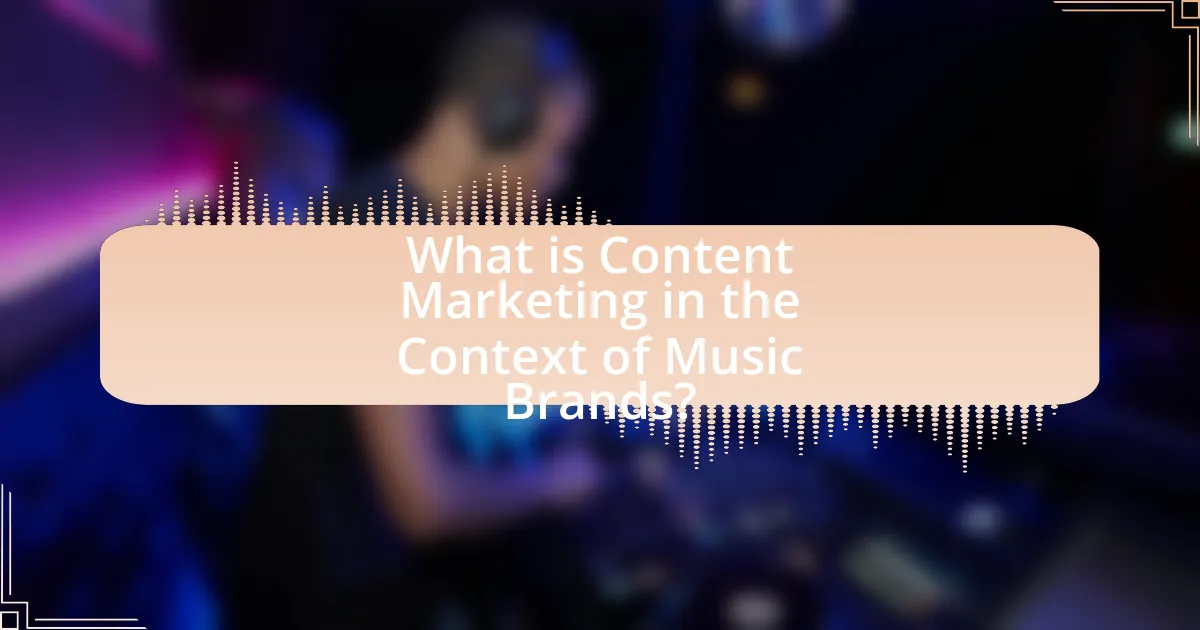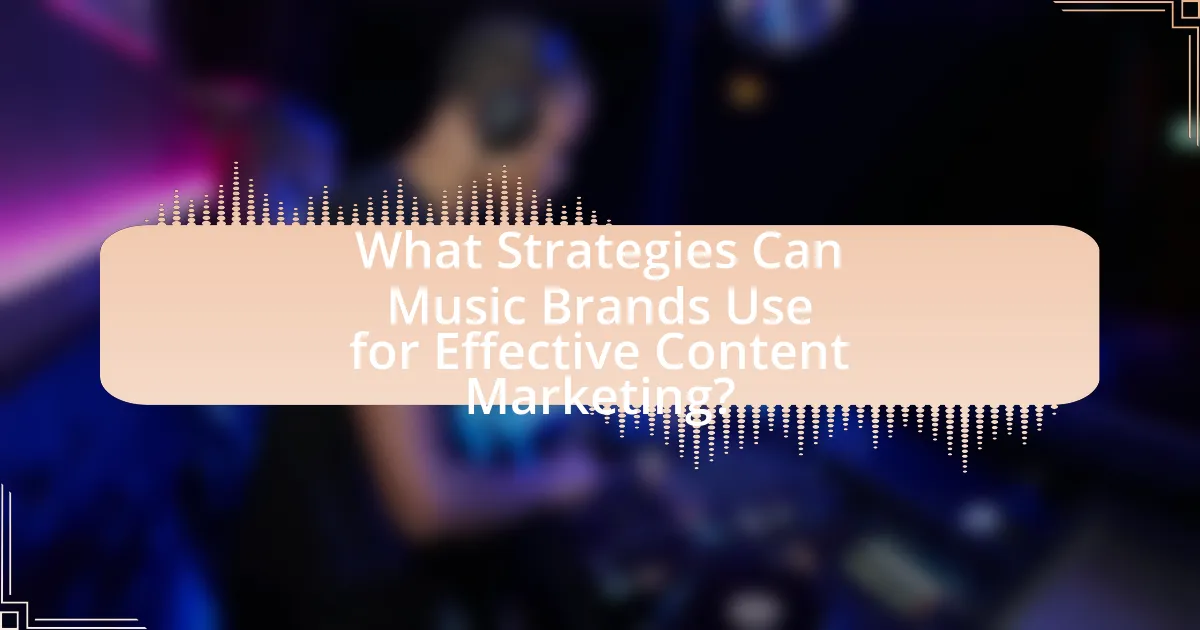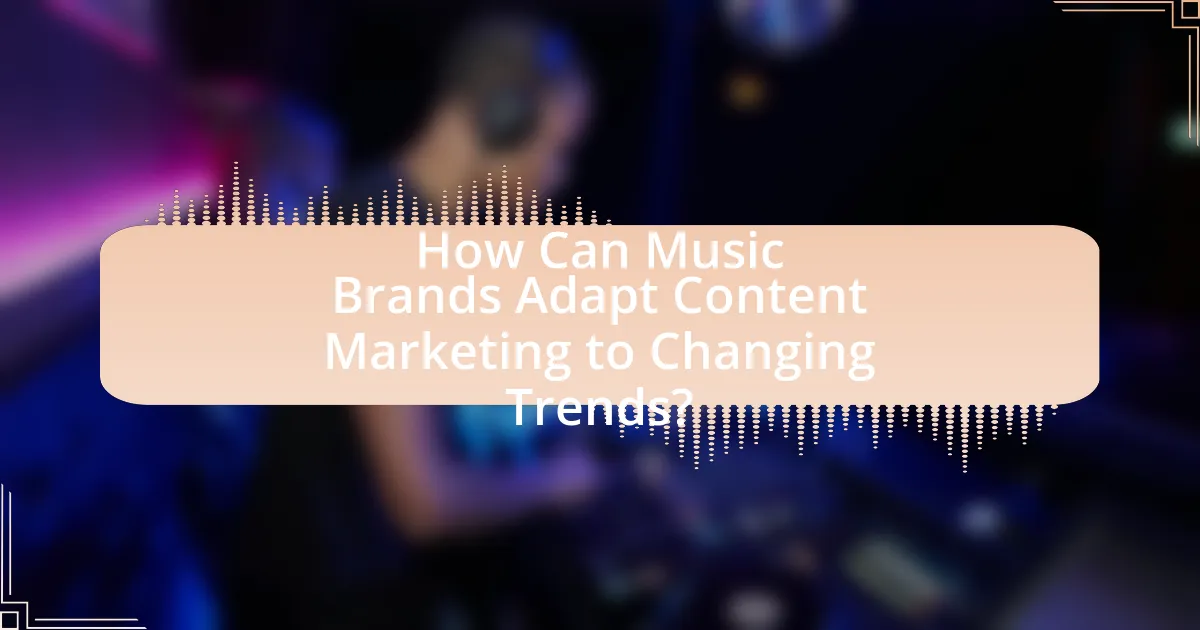Content marketing is a strategic approach used by music brands to create and distribute valuable content that engages audiences and promotes brand identity. This article explores the differences between content marketing and traditional marketing, emphasizing the importance of storytelling, audience engagement, and multimedia content in building brand loyalty and visibility. Key strategies for effective content marketing, including leveraging social media, user-generated content, and data analytics, are discussed, along with best practices for measuring success and adapting to emerging trends. The article highlights the challenges music brands face in content creation and distribution, offering practical tips to enhance their marketing efforts and maintain consistency in their messaging.

What is Content Marketing in the Context of Music Brands?
Content marketing in the context of music brands refers to the strategic creation and distribution of valuable content to engage audiences and promote the brand’s identity. This approach enables music brands to connect with fans through various formats such as videos, blogs, social media posts, and podcasts, fostering a deeper relationship and enhancing brand visibility. For instance, a study by the Content Marketing Institute found that 70% of consumers prefer getting to know a company via articles rather than ads, highlighting the effectiveness of content marketing in building brand loyalty and awareness in the music industry.
How does content marketing differ from traditional marketing for music brands?
Content marketing for music brands focuses on creating valuable, engaging content to build relationships with audiences, while traditional marketing emphasizes direct promotion and sales. Content marketing allows music brands to connect with fans through storytelling, behind-the-scenes videos, and interactive social media posts, fostering community and loyalty. In contrast, traditional marketing often relies on advertisements and promotional campaigns that may not engage audiences on a personal level. Research indicates that 70% of consumers prefer learning about a company through articles rather than ads, highlighting the effectiveness of content marketing in capturing audience interest and enhancing brand visibility.
What are the key elements of content marketing for music brands?
The key elements of content marketing for music brands include storytelling, audience engagement, social media presence, and multimedia content. Storytelling allows music brands to connect emotionally with their audience, fostering loyalty and interest. Audience engagement is crucial, as it involves interacting with fans through comments, polls, and live sessions, which can increase brand visibility and community building. A strong social media presence is essential for sharing content and reaching wider audiences; platforms like Instagram and TikTok are particularly effective for music promotion. Lastly, utilizing multimedia content, such as videos, podcasts, and behind-the-scenes footage, enhances the overall experience and keeps the audience engaged. These elements collectively contribute to a music brand’s visibility and success in a competitive market.
How can music brands leverage storytelling in their content marketing?
Music brands can leverage storytelling in their content marketing by creating narratives that resonate emotionally with their audience. This approach allows brands to connect on a deeper level, fostering loyalty and engagement. For instance, brands can share the journey of an artist, highlighting personal struggles and triumphs, which can humanize the brand and make it relatable. Research indicates that storytelling can increase audience retention by up to 65%, as narratives are more memorable than facts alone. By integrating authentic stories into their marketing strategies, music brands can enhance their visibility and strengthen their connection with fans.
Why is content marketing essential for enhancing music brand visibility?
Content marketing is essential for enhancing music brand visibility because it creates engaging and shareable content that resonates with audiences. This strategy allows music brands to connect with fans on a deeper level, fostering loyalty and increasing reach. For instance, according to a report by HubSpot, companies that prioritize content marketing see conversion rates six times higher than those that do not. By producing high-quality content such as music videos, behind-the-scenes footage, and artist interviews, music brands can effectively capture attention and improve their online presence.
What role does audience engagement play in content marketing for music brands?
Audience engagement is crucial in content marketing for music brands as it fosters a deeper connection between the brand and its audience. Engaged audiences are more likely to share content, attend events, and purchase merchandise, which directly impacts a brand’s visibility and revenue. For instance, a study by Nielsen found that 92% of consumers trust recommendations from friends and family over any other form of advertising, highlighting the importance of audience interaction in amplifying brand messages. Additionally, music brands that actively engage with their audience on social media platforms see higher levels of loyalty and advocacy, leading to increased brand awareness and market presence.
How does content marketing impact brand loyalty in the music industry?
Content marketing significantly enhances brand loyalty in the music industry by fostering deeper connections between artists and their audiences. Through engaging content such as behind-the-scenes videos, interviews, and interactive social media posts, artists can create a sense of community and belonging among fans. This emotional engagement leads to increased trust and loyalty, as evidenced by a study from the Content Marketing Institute, which found that 70% of consumers feel closer to brands that provide personalized content. Additionally, consistent content marketing efforts can keep fans informed and excited about new releases, tours, and merchandise, further solidifying their loyalty to the brand.

What Strategies Can Music Brands Use for Effective Content Marketing?
Music brands can use storytelling, social media engagement, and user-generated content as effective content marketing strategies. Storytelling allows brands to connect emotionally with their audience by sharing the journey of artists, which can increase listener loyalty; for instance, brands like Red Bull have successfully used storytelling to enhance their image and connect with consumers. Social media engagement is crucial, as platforms like Instagram and TikTok enable brands to reach wider audiences through interactive content, with TikTok reporting that 67% of users feel more connected to brands that engage with them. User-generated content encourages fans to create and share their own experiences related to the music brand, fostering community and authenticity; studies show that 79% of consumers say user-generated content highly impacts their purchasing decisions.
How can music brands create compelling content that resonates with their audience?
Music brands can create compelling content that resonates with their audience by understanding their target demographic and tailoring content to their preferences and interests. This involves conducting audience research to identify key characteristics such as age, location, and musical tastes, which allows brands to produce relevant and engaging material. For instance, a study by Nielsen Music found that 70% of music listeners prefer personalized content, indicating that customization can significantly enhance audience engagement. Additionally, leveraging storytelling techniques in content, such as sharing behind-the-scenes experiences or artist journeys, can foster emotional connections with fans, further solidifying brand loyalty.
What types of content are most effective for music brands?
Engaging video content is the most effective type for music brands, as it captures attention and fosters emotional connections. Research indicates that videos generate 1200% more shares than text and images combined, making them a powerful tool for audience engagement. Additionally, behind-the-scenes footage, music videos, and live performances resonate well with fans, enhancing brand visibility and loyalty. According to a study by Wyzowl, 84% of consumers say they’ve been convinced to buy a product or service after watching a brand’s video, highlighting the effectiveness of this content type in driving sales and brand recognition.
How can music brands utilize social media for content distribution?
Music brands can utilize social media for content distribution by creating engaging multimedia content that resonates with their target audience. This includes sharing music videos, behind-the-scenes footage, live performances, and interactive posts that encourage audience participation. According to a 2021 report by the International Federation of the Phonographic Industry, 79% of music consumers engage with artists on social media, highlighting its effectiveness as a distribution channel. By leveraging platforms like Instagram, TikTok, and YouTube, music brands can reach wider audiences, foster community engagement, and drive traffic to their music streaming services, ultimately enhancing their visibility and brand loyalty.
What are the best practices for optimizing content marketing efforts?
The best practices for optimizing content marketing efforts include creating high-quality, relevant content tailored to the target audience, utilizing SEO strategies to enhance visibility, and leveraging analytics to measure performance. High-quality content engages users and encourages sharing, which is essential for brand visibility in the music industry. SEO strategies, such as keyword optimization and backlinking, improve search engine rankings, making it easier for potential fans to discover the music brand. Analytics tools, like Google Analytics, provide insights into user behavior and content performance, allowing marketers to refine their strategies based on data-driven decisions. According to HubSpot, companies that prioritize blogging are 13 times more likely to achieve a positive ROI, underscoring the importance of consistent, quality content in driving marketing success.
How can music brands measure the success of their content marketing campaigns?
Music brands can measure the success of their content marketing campaigns through key performance indicators (KPIs) such as engagement rates, conversion rates, and audience growth. Engagement rates, which include likes, shares, comments, and video views, provide insight into how well the content resonates with the audience. For instance, a study by HubSpot found that brands with higher engagement rates typically see a 20% increase in customer loyalty. Conversion rates, which track the percentage of users taking desired actions (like signing up for a newsletter or purchasing merchandise), are crucial for assessing the effectiveness of content in driving sales. According to a report by Content Marketing Institute, 70% of marketers say that measuring conversion rates is essential for evaluating content success. Additionally, audience growth metrics, such as follower counts and subscriber numbers, indicate the reach and impact of the content marketing efforts. By analyzing these metrics, music brands can gain a comprehensive understanding of their content marketing effectiveness and make informed adjustments to their strategies.
What tools can assist music brands in their content marketing strategies?
Music brands can utilize social media management tools, email marketing platforms, and analytics software to enhance their content marketing strategies. Social media management tools like Hootsuite and Buffer allow brands to schedule posts, engage with audiences, and analyze performance across multiple platforms, which is crucial for maintaining a consistent online presence. Email marketing platforms such as Mailchimp enable music brands to create targeted campaigns, segment their audience, and track engagement metrics, facilitating direct communication with fans. Additionally, analytics software like Google Analytics provides insights into website traffic and user behavior, helping brands refine their content strategies based on data-driven decisions. These tools collectively support music brands in reaching their audience effectively and measuring the impact of their marketing efforts.

How Can Music Brands Adapt Content Marketing to Changing Trends?
Music brands can adapt content marketing to changing trends by leveraging data analytics to understand audience preferences and tailoring their content accordingly. By analyzing streaming data, social media interactions, and demographic insights, music brands can identify emerging trends and adjust their marketing strategies to resonate with their target audience. For instance, a report by Nielsen Music indicates that 70% of listeners prefer personalized content, highlighting the importance of customization in marketing efforts. Additionally, incorporating user-generated content and collaborating with influencers can enhance engagement and authenticity, aligning with current consumer expectations for relatable and genuine interactions.
What emerging trends should music brands consider in their content marketing?
Music brands should consider the integration of interactive content, such as live streaming and augmented reality experiences, in their content marketing strategies. Interactive content engages audiences more effectively, as evidenced by a study from the Content Marketing Institute, which found that 70% of consumers prefer to learn about products through interactive content rather than traditional methods. Additionally, leveraging user-generated content can enhance authenticity and community engagement, with 79% of consumers indicating that user-generated content highly impacts their purchasing decisions. These trends not only increase brand visibility but also foster deeper connections with audiences.
How can music brands stay relevant in a rapidly changing digital landscape?
Music brands can stay relevant in a rapidly changing digital landscape by leveraging content marketing strategies that engage their audience and adapt to new trends. By creating high-quality, shareable content such as music videos, behind-the-scenes footage, and interactive social media posts, brands can foster a deeper connection with fans. For instance, according to a report by HubSpot, 54% of consumers want to see more video content from brands they support, highlighting the importance of visual storytelling in maintaining relevance. Additionally, utilizing data analytics to understand audience preferences allows music brands to tailor their content effectively, ensuring it resonates with their target demographic.
What role does user-generated content play in modern music marketing?
User-generated content (UGC) plays a crucial role in modern music marketing by fostering authentic engagement and expanding reach. UGC, such as fan-created videos, covers, and social media posts, enhances a music brand’s visibility by leveraging the creativity and enthusiasm of the audience. According to a study by the Content Marketing Institute, 79% of people say user-generated content highly impacts their purchasing decisions, indicating its effectiveness in influencing consumer behavior. This organic promotion not only builds community but also provides artists with valuable insights into their audience’s preferences, ultimately driving sales and streaming numbers.
What are the common challenges music brands face in content marketing?
Music brands commonly face challenges in content marketing such as audience engagement, content saturation, and platform algorithm changes. Audience engagement is difficult due to the vast amount of content available, making it hard for music brands to capture attention. Content saturation occurs when numerous brands produce similar content, leading to diminished uniqueness and impact. Additionally, platform algorithm changes can affect visibility and reach, as social media platforms frequently update their algorithms, making it challenging for music brands to maintain consistent engagement with their audience. These challenges highlight the need for innovative strategies to stand out in a competitive landscape.
How can music brands overcome obstacles in content creation and distribution?
Music brands can overcome obstacles in content creation and distribution by leveraging data analytics to understand audience preferences and optimizing their content strategies accordingly. By analyzing metrics such as engagement rates and demographic insights, brands can tailor their content to resonate with their target audience, ensuring higher relevance and impact. For instance, a study by Nielsen Music found that 70% of listeners prefer personalized content, indicating that data-driven approaches can significantly enhance audience connection. Additionally, utilizing platforms like social media for direct distribution allows brands to bypass traditional gatekeepers, facilitating quicker and more effective content dissemination.
What strategies can help music brands maintain consistency in their content marketing?
Music brands can maintain consistency in their content marketing by developing a comprehensive content strategy that includes a content calendar, brand guidelines, and audience engagement metrics. A content calendar helps schedule posts and ensures a steady flow of content, while brand guidelines establish a uniform voice, style, and visual identity across all platforms. Additionally, tracking audience engagement metrics allows brands to adjust their strategies based on what resonates with their audience, ensuring that content remains relevant and consistent. Research indicates that brands with a clear content strategy see a 60% increase in engagement, highlighting the importance of these strategies in achieving consistency.
What practical tips can enhance content marketing for music brands?
To enhance content marketing for music brands, focus on creating engaging multimedia content that resonates with the target audience. Music brands should leverage platforms like Instagram and TikTok to share behind-the-scenes footage, artist interviews, and live performances, as these formats drive higher engagement rates. For instance, a study by HubSpot found that video content generates 1200% more shares than text and images combined, highlighting the effectiveness of visual storytelling in reaching wider audiences. Additionally, collaborating with influencers in the music industry can amplify brand visibility, as influencers often have dedicated followings that trust their recommendations. By consistently analyzing audience engagement metrics, music brands can refine their content strategies to better align with listener preferences, ensuring ongoing relevance and connection with their audience.